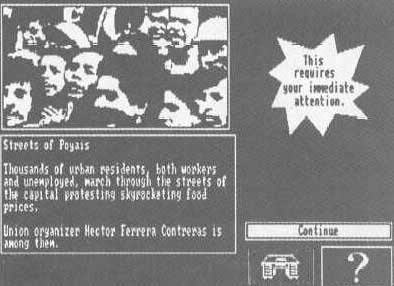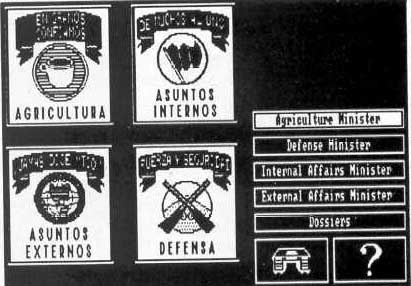LEARNING

EVERY KID CAN GROW UP TO BE EL PRESIDENTE, BUT ONLY A FEW SURVIVE TO THE NEXT ELECTION
COMPUTE! CHOICE
KRISTEN STERNBERG
After a particularly bloody revolution in a certain Central American country, you suddenly find that you are el Presidente. What do you do? You're faced with food shortages, government corruption, angry crowds, and a myriad of other problems. Your cabinet might back you on important issues—then again, they might not. There's the laborers to pacify, but there's the elite crying out for their just desserts, too. Balance the budget. Maintain friendly relations with the superpowers of the world. Stay in power. Stay alive. A president's work is never done.
As President, you make decisions that affect your whole country. The people of Chimerica have bitterly competing interests, and you may have to compromise your own beliefs. When you consider the demands of coffee pickers and rich landowners, or of bankers and doctors, you learn precisely how complex running a country can be. For instance, if you're concerned about the quality of health care and you decide to increase the funding for clinics, you may not have enough money for the defense budget or for the roads that carry your export crops to the outside world.
Against this background of conflict, your object is to remain in power for three years. Against these considerable odds, you try to establish some economic stability and to improve social conditions.
Your first official act in Hidden Agenda is to hold a press conference where you define the goals for your presidential term. Then you appoint your cabinet. After inspecting representatives from the three political parties, you should choose the ministers who will give you the best advice.
As you play Hidden Agenda, you consult with them and other influential Chimericans. Most of your decisions aren't simply influenced by these people; rather, your decisions are controlled by these people. To take action in this game, you must encounter either your ministers or your people. Each encounter centers around a problem raised by one of these people. Your ministers propose solutions, and the people involved propose other solutions. For every crisis, you can choose from many responses, but you can't offer any original ideas. You ask for advice, and you either take it or leave it.

Each time you act on one of these proposals, you've made one move; every nine moves make up one season. Three seasons make up a year, and, if you make it through three years, you win. (With the sacrifices you've had to make to survive, "winning" becomes a relative term.) In the beginning, your tasks seem easy. But, later, when the pace quickens, you're forced to make snap decisions.
You won't always be notified of problems until they escalate, sometimes dramatically. While dealing with one character, others can interact with each other and even make their own decisions without your knowledge. At times, you'll be confronted with proposals that directly contradict each other. Compromise is tough when no one will give an inch.
You judge your progress in several ways. You get feedback from the people you encounter, and the newspapers evaluate your work, too. You can also check out the progress charts. Your ministers will of course have something to say about each decision you make. If you don't pay attention to their feedback, you might find that you've lost control.

This simulation is so comprehensive that I found few limitations. For instance, although the characters didn't change each time I played, they never became stale. I found that knowledge of the positions they represented increased my interest and my strength in decision making. I knew that I could count on certain people to back me, and I knew when others were likely to become restless. This doesn't mean that each character says the same thing every time, either. As you progress through the game, you'll find that their propositions vary quite a bit depending on the time of year and on your previous actions.
These people are varied and interesting, and each has one or more pet issues. Realism is the name of the game here. At first, in my ignorance, I simply chose to meet with people whose viewpoints interested me or people who might address the problems I anticipated during my term. For example, I thought the Cuban consul was one of the least of my worries—until I ignored him; and he shipped out in disgust, taking with him badly needed economic assistance from that country.
Hidden Agenda is entirely menu-driven, but this program can be fast-paced, exhilarating, and full of surprises. The screens are more diverse than in any program I've seen. You'll get to know the various icons, the many charts, and the photos of each person you contact. There are even animated screens. You'll always find something new to look at—or to worry about.
Your cabinet members are a real challenge. For one thing, they are very quick with their disapproval if your decision goes against their advice. Also, choose those ministers that will offer solutions you can live with, otherwise you may be forced to fire some of them. You can always replace a bad minister with a new one, but there's a limited pool of choices. One other thing: A cabinet member can turn on you. One of mine decided to lead her own revolution. From this experience I got a lot of practice bargaining with people. I also ordered my first execution.
For a complete description of the simulation and game pl ay, you can read the extensive manual and the reference guide. The reference guide includes an extensive glossary of terms from the program and from the real world. The manual explains how to interpret charts and gives you some background on Chimerica. Both are full of diagrams and sample screens, A separate teacher's manual is also available. Although the documentation is very helpful, you can also jump right in. Online help guides you through the preliminary operations and tells you about each feature as you use it.
Some of your best help will come from a specially designed desk. Instead of paperweights and address books, your desk is equipped with icons representing different aspects of the game. Under the Reports icon, you'll find several national and international newspapers. I found the articles really valuable because they kept me in touch with events I might have otherwise unknowingly neglected. If you read the newspapers as soon as you get in office, you'll be rewarded with a detailed synopsis on the slate of the country, and you can use the information to make intelligent decisions. Remember that each press has its own point of view and its own interest to serve. A newspaper can be as biased as a union activist.
To keep track of your decisions, consult your logbook, another icon on your desk. Choose the progress charts for a wealth of statistics on important issues such as crops, exports, and infant-mortality rates. For finding your way through the countryside, a map is included.
You'll need a graphics adapter and either two 5 ¼-inch floppy drives, one 3½-inch drive, or a hard disk to run the game. Hidden Agenda is not copy-protected, and you arc urged to make working copies of the original or to install it on the hard disk before you start.
Even thought the world of Chimerica was well constructed, a few problems with the mechanics of the game caused me some minor dismay
First, although the manual and quick-start reference guide instruct you to type ha to load the game, that didn't work for me. I inspected the disk's directory and then typed agenda, which gave the proper results.
A second problem was more troublesome. When I inspected my logbook during the game, I selected an option that prints the entire log. The program froze, and I had to reboot-just because I had forgotten to turn on my printer.
The third problem is more serious still. When I wanted to go back to a previous screen, I thought the logical step was to press the escape key. It wasn't. Hidden Agenda jumped me all the way back to DOS, and I lost all the time I had put into the game. I wish there had been the familiar Are you sure you want to quit (Y/N)? prompt.
A fourth problem makes Hidden Agenda compelling by forcing you to play the game all the way through at one sitting. Although there are instructions for saving a game in progress, I never successfully restored one from a floppy disk. I tried, but although the saved screens came up, they were filled with gibberish. It was impossible to continue. I contacted the company for advice about this problem, and after extensive testing they assured me that the bug only showed up when you load Hidden Agenda from a floppy disk. There seems to be no problem running it from a hard disk. Springboard assured me that they would begin working on a revision at once. They also told me that anyone who runs into the same trouble should contact the company for a free replacement disk. Until the revision is available, however, plan to spend an hour or two completing your presidential term


Still Hidden Agenda's, strong points far outweigh its faults. This absorbing game is very detailed and intricate. You'd never guess how involved the plot is and how much information the program is storing.
For instance, I didn't realize the extent to which the program kept track of my every move until I reached the end of my first game. When I read the encyclopedia excerpt that analyzed my performance during those three years in office, I was amazed at what was mentioned. The analysts saw fit to discuss every moment of indecision I ever had. It was a fascinating and sometimes embarrassing evaluation. The report of my years in office mentioned details I had already forgotten, and I learned that you can't fool—or please—all of the people all of the time. After the encyclopedic judgment of my performance, I had to start over again. That's a chance most leaders don't get.
|
Hidden Agenda IBM PCs and compatibles (3½- or 5¼-inch disks)—$59.95 Macintosh—$59.95 SPRINGBCW1D SOFTWARE 7808 Creekridge Cir, Minneapolis, MN 55435 (800) 445-4780 |